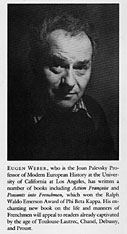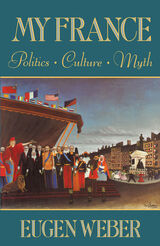
Apocalyptic visions and prophecies from Zarathustra to yesterday form the luxuriant panorama in Eugen Weber's profound and elegant book. Beginning with the ancients of the West and the Orient and, especially, with those from whom we received our religions, the Jews and earliest Christians, Weber finds that an absolute belief in the end of time, when good would do final battle with evil, was omnipresent. Within centuries, apocalyptic beliefs inspired Crusades, scientific discoveries, works of art, voyages such as those of Columbus, rebellions and reforms. In the new world, American abolitionists, who were so critical to the movement to end slavery, believed in a final reckoning. The nineteenth and twentieth centuries' apocalyptic movements veered toward a lunatic fringe, and Weber rescues them from obloquy. From this more than two millennia history, he redresses the historical and religious amnesia that has consigned the study of apocalypses and millennial thought to the ash heap of thought and belief.
Weber, a master storyteller, turns detective in this latest book as he finds these alternative rationalities in the West, Asia, Africa, and South America. He writes with profound respect for the millennial pulse in history while never losing his urbane and witty style of writing. As we approach our second millennium beset by a host of apocalyptic predictions and cults, this book offers a map of understanding of the creeds we ignore at our peril.

The end of the nineteenth century in France was marked by political scandals, social unrest, dissension, and “decadence.” Yet the fin de siècle was also an era of great social and scientific progress, a time when advantages previously reserved for the privileged began to be shared by the many. Public transportation, electrical illumination, standard time, and an improved water supply radically altered the life of the modest folk, who found time for travel and leisure activities—including sports such as cycling. Change became the nature of things, and people believed that further improvement was not only possible but inevitable.
In this thoroughly engaging history, Eugen Weber describes ways of life, not as recorded by general history, but as contemporaries experienced them. He writes about political atmosphere and public prejudices rather than standard political history. Water and washing, bicycles and public transportation engage him more than great scientific discoveries. He discusses academic painting and poster art, the popular stage and music halls, at greater length than avant-garde and classic theater or opera. In this book the importance of telephones, plumbing, and central heating outranks such traditional subjects as international developments, the rise of organized labor, and the spread of socialism.
Weber does not neglect the darker side of the fin de siècle. The discrepancy between material advance and spiritual dejection, characteristic of our own times, interests him as much as the idea of progress, and he reminds us that for most people the period was far from elegant. In the lurid context of military defeat, political instability, public scandal, and clamorous social criticism, one had also to contend with civic dirt, unsanitary food, mob violence, and the seeds of modern-day scourges: pollution, drugs, sensationalism, debased art, the erosion of moral character. Yet millions of fin de siècle French lived as only thousands had lived fifty years before; while their advance was slow, their right to improvement was conceded.

“Lots of Romanians, in my day, dreamed of France; not many got there,” writes the author in his introduction. “Fortuitousness, contingency, and sheer good luck made me fall into France, just as one falls into love.” Fifty years after reaching France, by way of school in England, Eugen Weber presents a series of illuminations on the country he loves, and whose civilization he has made the center of his life's work as an interpreter of European history, subspecialty France.
My France focuses on some of the most intriguing aspects of French life: polities, myths, personalities, public problems, actions, conflicts. The topics Weber treats range from sports to religion, and include comments on folklore, peasant politicization, national socialism, the nature of the French right, antisemitism, and famous Frenchmen such as Pierre de Coubertin, Maurice Barres, and Marc Bloch. In every chapter he questions established assumptions, asks if things are quite as they are taken to be, and points out links between apparently unrelated doings (literature and private income, religion and superstition, fairy tales and everyday life). Every essay reflects his unique insight and is enlivened by his witty and graceful style, making My France irresistible not only to students of modern European history, but also to Francophiles and pundits of Europe everywhere.

The picturesque town of Dreux, 60 miles west of Paris, quietly entered history in 1821, when Victor Hugo won the hand of his beloved there. Another century and a half would pass before the town made history again, but this time there was nothing quiet about it. In 1983, Jean-François Le Pen’s National Front candidates made a startling electoral gain in the Dreux region. Its liberal traditions had ended abruptly. With the radical right controlling the municipal council and the deputy mayor’s office, Dreux became the forerunner of neofascist advances all across the nation. How could it happen?
A trained historian, Françoise Gaspard was born in Dreux and served as the city’s socialist mayor from 1977 to 1983. She brings this experience to bear in her study, giving us an evocative picture of the town in all its particularity and at the same time fitting it into the broader context. Local history, collective memory, political life, the role of personality, partisanship, and rumor, the claims of newcomers and oldtimers, Muslims and Catholics: Gaspard sifts through these factors as she crafts a clear and rousing account of the conditions that brought the National Front to power. Viewed amid the explosive consequences of recent demographic and economic transformations, Dreux, with a population of about 30,000, is facing big-city problems: class conflict, unemployment, racism. This is a book about the decline of small-town “virtues” and, more ominously, the democratic ideal in France. With its disturbing implications for other European nations and the United States, it could well be a parable for our time.
READERS
Browse our collection.
PUBLISHERS
See BiblioVault's publisher services.
STUDENT SERVICES
Files for college accessibility offices.
UChicago Accessibility Resources
home | accessibility | search | about | contact us
BiblioVault ® 2001 - 2024
The University of Chicago Press









